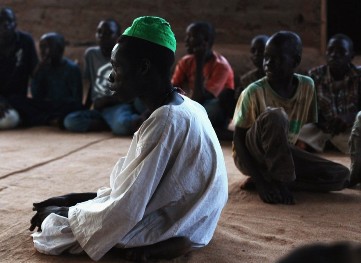Sudanese official hails secular system in S. Sudan
October 8, 2013 (KHARTOUM) – The Sudanese state minister at the Ministry of Guidance and Endowments Mohamed Mustafa al-Yakooti described South Sudan’s adoption of a secular system as “positive”, in an unusual admission by an official from Khartoum’s Islamist government.

The official told the consultative coordination meeting on the executive program with the Islamic Council of Southern Sudan in Khartoum on Tuesday that his ministry is seeking to upgrade a memorandum of understanding with the council to a higher partnership.
He stressed that the expansion of the proselytizing movement in the south is a religious duty.
Around 10% of South Sudan’s population is Muslim. The region seceded from Sudan on 9 July 2011 as part of a peace deal that ended decades of civil war, which was often categorized as one between Sudan’s predominantly Islamic north and Christian south.
Many critics assert that the separation of Sudan into north and south in July 2011 was in part a result of Khartoum’s insistence on Islamic law.
Sudanese officials including president Bashir made it clear that following South Sudan’s independence the upcoming constitution will be “100% Islamic”.
Muslims in South Sudan are believed to be generally well treated though they have filed complaints with the government regarding their properties consisting of buildings that they claim are confiscated by state governments.
By contrast, since early 2013 Sudanese authorities have started scrutinizing the activities of Christian organizations in the country.
Following the detention of a recent convert to Christianity and several Coptic Church representatives in December 2012, authorities have reportedly destroyed several churches in and around the Khartoum area.
A number of foreigners accused of proselytizing were also deported, while authorities conducted raids on a number of religious institutions, confiscating books to check on their content.
Several church-affiliated institutions such as orphanages or schools have also been closed, according to the Geneva-based World Council of Churches, a global ecumenical church body.
In April 2012, a violent crowd ransacked the compound of a Presbyterian church in Khartoum, burning Bibles and looting the buildings.
In a separate incident last June, bulldozers sent by officials from the ministry of planning and housing destroyed two church buildings belonging to the St John Episcopal Church in Khartoum, claiming worshipers lacked a permit to occupy the land.
(ST)
